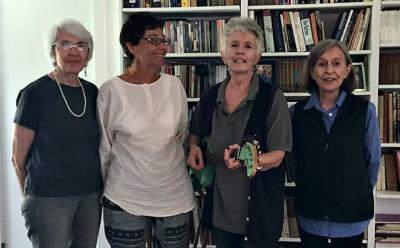Women’s Movement Pioneers Reunite

The East End Women’s Alliance has no real organizational structure and no formal positions, although a couple of its members call Lilia Melani “captain” for her ability to coordinate events. Mostly, its members gather to talk and discuss reproductive and women’s rights, which since 1971 they turned to action each year in the form of their Women’s Equality Day, which commemorates women’s suffrage in 1920.
This occasion has fallen by the wayside since the late 1990s, and many of the alliance’s original members have died, but when the five women still here reunited last year to donate their archival photos and videos to Barnard College, someone suggested they revive the Equality Day. And so they did for the 95th anniversary of women’s right to vote.
A Women’s Equality Day celebration will be held on Saturday from 10 a.m. to noon at the East Hampton High School. Admission is free.
This year, icons and trailblazers from the past will speak, including Marilyn Fitterman, Judy Lerner, Phyllis Chesler, and Bill Baird. Helen Rattray, the publisher of The Star and its former longtime editor, will be honored for her work at the newspaper.
“She’s a pioneer,” said Sandy Rapp, a member and the group’s singer, about Ms. Rattray. “She’s a great example of feminism at work. We’re proud of her.”
The speakers also have deep roots in feminism. Ms. Fitterman is a past president of the New York State National Organization for Women and is now the East End president. She has given speeches about hate crimes, the separation of church and state, abortion, and other feminist topics.
Ms. Lerner, now in her mid-90s, recently joined the United Nations executive committee to represent nongovernmental organizations. During her years as a civil rights activist, she traveled to Cuba in protest, chained herself to a White House gate during the Vietnam War, and found a mentor in her college friend for life, the late Bella Abzug.
Ms. Chesler became a feminist after she married an Afghan in the 1960s, moved to Kabul, and endured such confining, prison-like treatment that she longed to escape. She wrote in an essay in 2006 adapted from her book, “Death of Feminism,” that as her time wore on in Afghanistan, she underwent house arrest and suffered from hepatitis after her mother-in-law ordered that her water no longer be boiled. These incidents shaped her activism later in life.
Mr. Baird also fought for women. A pioneer of reproductive rights, he was convicted of a felony after handing out a contraceptive to a woman following a lecture of his at Boston University. His case went to the United States Supreme Court, which ruled that unmarried people have a right to contraceptives, prohibited in Massachusetts at the time.
On a recent Friday morning in the living room of Astrid Myers-Rosset, an alliance member, four members of the organization congregated to talk about their work and reminisce about their milestones. The height of the women’s movement across America happened in the 1970s, when birth control became legal and the Roe v. Wade decision on a woman’s right to abortion became a landmark case. During those years, throngs of men and women marched along Main Street in East Hampton on Equality Day, waving colorful banners hand-painted by local female artists. The alliance held two-day conferences at the Amagansett School to discuss rape, marriage, and work.
Their most memorable Equality Day occurred years later, in the summer of 1984. The women had invited Geraldine Ferraro, the first female vice presidential candidate, to speak about Reaganomics and women. Secret service men swarmed the area and the roads cleared, but it still took Ms. Ferraro four hours to drive from Westhampton to East Hampton. Around 300 people packed into the Amagansett School to see her. Ms. Rapp had opened the event with a concert and had to sing for hours until Ms. Ferraro arrived.
The alliance is still nervous about the state of women’s rights today, another reason its members decided to hold a panel discussion this year.
“Reproductive rights are at risk and equality is being eroded,” said Ms. Melani. “We would like to communicate a sense of urgency.”
Their biggest challenge this time around has been rallying the younger generations. Ms. Myers-Rosset recalled walking into a store on Newtown Lane where she handed a saleswoman a flyer.
“ ‘Oh, I didn’t know there was a problem,’ ” Ms. Myers-Rosset remembered the woman saying.
As the conversation turned back to modern-day politics, Ms. Rapp chimed in that, “It takes quite a degree of imagination,” for the government to lay claim to someone’s body. With that, she grabbed her mint green guitar and began belting out the lyrics to her song “Remember Rose: A Song for Choice,” about Rosie Jimenez, who died after an illegal abortion. When the chorus came around, the others chimed in.
Get your laws off me; I’m not your property
Don’t plan my family; I’ll plan my own
I don’t want to be in your theocracy
Remember liberty, remember Rose
The scene — Ms. Rapp strumming the verse and the three women looking on fondly — resembled an intimate campfire session. After all, bonding with one another is how this alliance blossomed and since 1971 how their feelings and thoughts became action.
